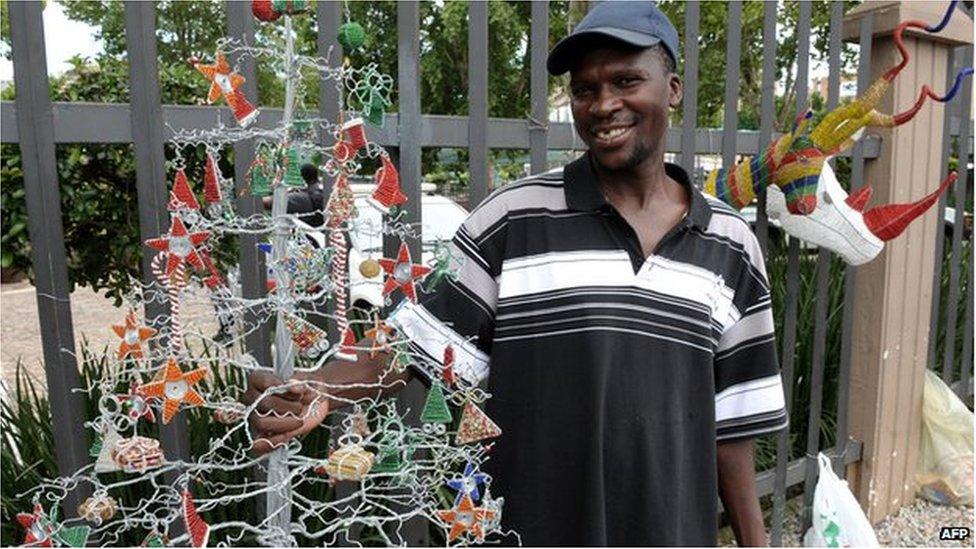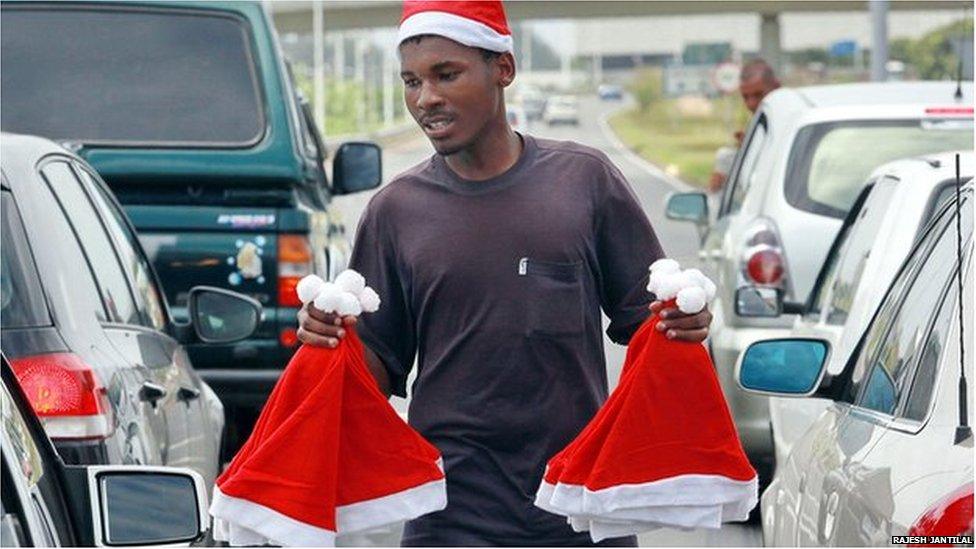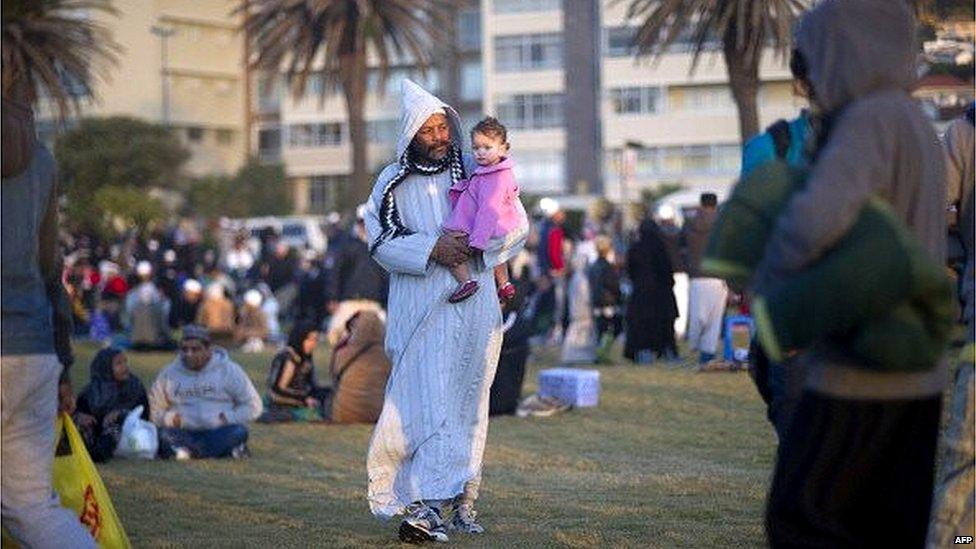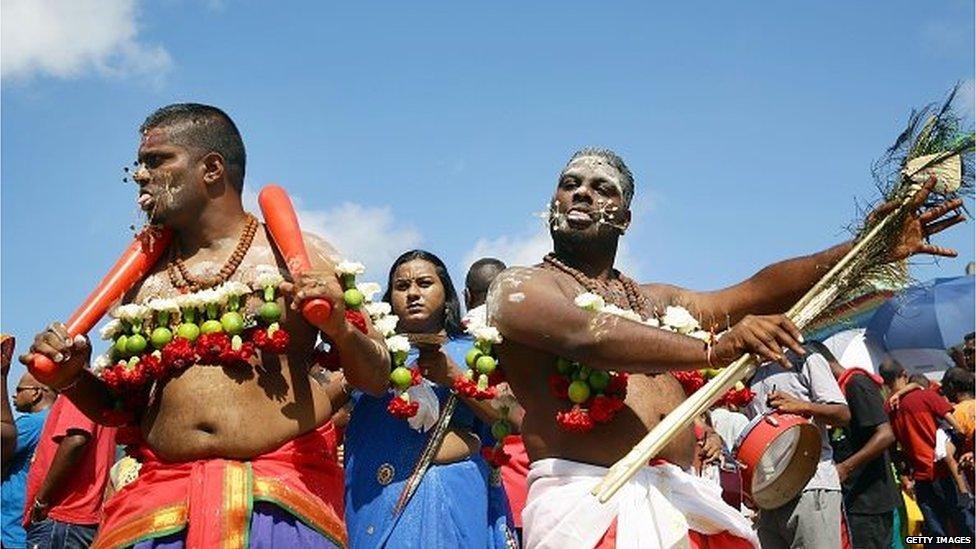Does South Africa have too many Christian holidays?
- Published
- comments

Christmas is the most celebrated holiday in South Africa
The number of religious holidays has come under scrutiny in South Africa, after a report suggested that minority groups were discriminated against because only Christian holidays are officially recognised.
Christmas Day is the only religious holiday which is also a national public holiday, after Easter Monday was officially renamed Family Day.
But South Africa's Law Reform Commission argues that is unfair and says holidays from all religions should be treated equally. The commission noted that members of other religious groups do not get paid when they skip work to observing their own holidays.
Some 80% of South Africans are classed as Christian, according to the most recent available statistics, although many combine their Christian beliefs with traditional practices.
The chairman of the Commission for the Promotion and Protection of Rights of Cultural, Religious and Linguistic Communities Thoko Mkhwanazi-Xaluva said she supports a change.
"We are trying to find a middle road for the country that's not going to make people angry, that's not going to start a religious war," she said.
"But once you take Christianity alone and you give all the Christians all the happiness and give others nothing, then it's unconstitutional," she added.
The commission says that the constitutional guarantee of minority rights should extend to recognition of minority faith holidays.

Minority religious groups say Christians holidays receive preferential treatment
It did not take too long before there was a push back from some Christians who were not happy with the proposal.
The leader of the African Christian Democratic Party (ACDP), Reverend Kenneth Meshoe, said that if Christmas was removed from the holiday calendar - to achieve equality - it would imply that "South Africans don't need God in their lives, which would have serious consequences".
Mr Meshoe also said that if the matter came before parliament, the ACDP would lobby Christians from other parties to vote in favour of retaining Christian holidays.
This is not the first time the matter has been raised here in South Africa.
In 1994 at the end of apartheid, Ascension Day was removed as a public holiday and Easter was officially renamed Family Day, although most people still refer to it as Easter.
Ten years later the issue of holidays was discussed again by the Department of Home Affairs but it was later abandoned.

Religion in South Africa (most recent figures)
Christianity: 79.8%
Islam: 1.5%
Hinduism: 1.2%
Judaism: 0.2%
Other beliefs: 0.6%
No religion: 15%
Undetermined: 1.4%
Source: Census 2001, external

But what has been the trend elsewhere on the continent?

Muslims are officially South Africa's second-biggest religious group
In Nigeria, Africa's most populous nation, which is roughly equally split between Christians and Muslims, both Christmas and the Prophet Muhammad's birthday Eid el-Maulud are national holidays.
In Senegal, a country I have visited many times and which enjoys one of the most harmonious relations between majority and minority groups on the continent, there is much more understanding.
In addition to Independence Day and Labour Day, it has numerous paid religious holidays.

Which country has most holidays?
India: Up to 21 a year (depending on state)
China: Varies per year - 20 in 2015
Colombia: 18
Lebanon, Burkina Faso: 17
Thailand: 16
Mauritius: 15
Senegal, Monaco: 14
Nigeria: 12 national holidays and two local holidays
Spain, South Africa, South Korea, Russia: 12
UK: 8
US: 10
Sources: wego.com; officeholidays.com; 2013 Mercer study and others

Some 94% of the country is Muslim and so Eid al-Fitr (the end of the fasting month of Ramadan) and Eid al-Adha (Feast of Sacrifice) are national holidays. Indeed, there are often two - when different sects celebrate the holidays on different days.
But Christmas Day, Easter and Ascension are also national holidays - and are celebrated by the 5% of the population who are Christians.
While this may go some way to forging religious harmony, business leaders there complain bitterly about the loss of productivity.
Back in South Africa, the business community is already complaining about the number of public holidays and so would not take kindly to the idea of appeasing minority groups by having any more religious holidays.
A task team was established two years ago to look into the idea of reducing the number.
Although there were some recommendations that the country could do without a couple of days holiday, it was generally accepted that comparatively, Africa's most industrialised economy was not out of kilter with the rest of the world.

There is also a large Hindu community
South Africa has 13 public holidays during the course of the year, Malaysia has 12 and the United States, Singapore and France 11.
Christo Botes, Executive Director of Business Partners Limited, said the problem was a month like April where they are crammed together in one month, affecting productivity levels.
So for business, the idea is not necessarily to reduce the number of bank holidays but to spread them out in such a way to reduce their impact on the factories and other industries.
During April's xenophobic attacks, some suggested that South Africa should have Africa Day on 25 May as a paid holiday, as is the case in many other countries on the continent.
The hope was that this would bring locals closer to the idea of an African Union ideology.
But no-one has raised this idea since the violence subsided.
So the debate about how many public holidays South Africans should enjoy looks set to rumble on.
- Published9 July 2024
